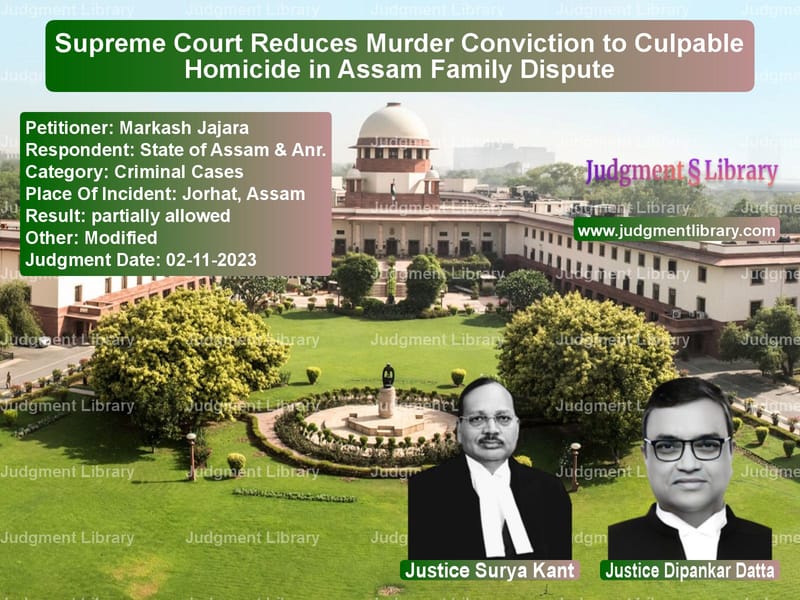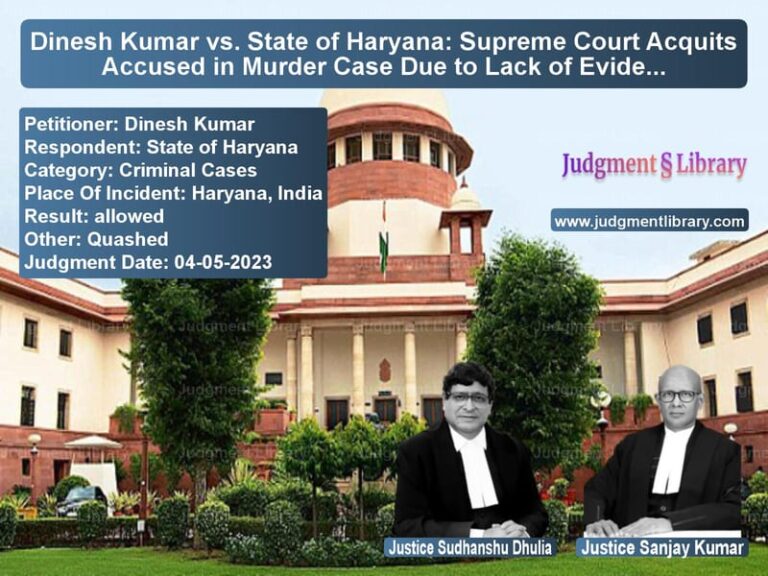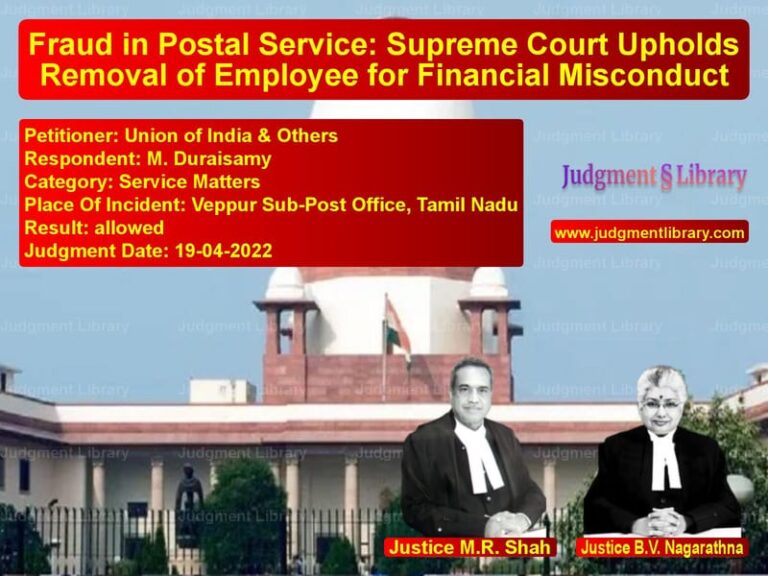Supreme Court Reduces Murder Conviction to Culpable Homicide in Assam Family Dispute
The Supreme Court of India recently ruled in Markash Jajara v. State of Assam & Anr., modifying a murder conviction to culpable homicide not amounting to murder. The appellant, Markash Jajara, was convicted for the killing of his son-in-law, Markush Borja. This judgment provides critical insights into how courts interpret provocation, self-control, and familial tensions in criminal cases.
Background of the Case
The case stemmed from an incident that took place in Jorhat, Assam, in 2015. The appellant, Markash Jajara, was accused of murdering his son-in-law, Markush Borja, using a bamboo stick following a heated altercation. The deceased had been staying with his in-laws for the last three to four months. The incident occurred within the appellant’s house, and the prosecution alleged that Jajara intentionally assaulted Borja, leading to his death.
The case was initially investigated by the police under Section 302 of the Indian Penal Code (IPC) (punishment for murder). Following a trial, the Sessions Court convicted Jajara and sentenced him to life imprisonment along with a fine of ₹10,000, failing which he would serve an additional six months in prison. The Gauhati High Court upheld the conviction in its judgment dated March 12, 2019, leading to the appellant’s plea before the Supreme Court.
Prosecution’s Case
The prosecution relied on the following key evidence:
- An eyewitness testimony from the appellant’s wife (PW-5) and daughter (PW-6), stating that the appellant had assaulted the deceased.
- A postmortem report confirming that the deceased had suffered multiple lacerations on his forehead, mastoid region, and chin, which were deemed fatal.
- A confession made by the appellant to his daughter, admitting that he had killed her husband.
The prosecution argued that the evidence conclusively proved that the appellant had murdered his son-in-law with the intent to kill.
Defense’s Arguments
The defense raised several key points:
- The appellant acted in a fit of sudden and grave provocation, as the deceased was known to be an alcoholic who frequently quarreled with and ill-treated his wife.
- The appellant had no premeditated intent to kill his son-in-law.
- The assault was an act of parental frustration, aimed at stopping the deceased from harassing the appellant’s daughter.
- The statement made by the appellant to his daughter was not a legally valid confession and could not be used as primary evidence.
Supreme Court’s Analysis
1. Evaluating Provocation and Loss of Self-Control
The Supreme Court analyzed the events leading up to the incident and concluded that the appellant had been under grave and sudden provocation. The Court emphasized that the deceased had a history of abusive behavior towards his wife and in-laws, which had reached a tipping point.
“The appellant’s only concern was to protect the life and dignity of his daughter, who was his only child. His act, though regrettable, was not premeditated murder.”
2. Exception 1 of Section 300 IPC
The Court ruled that the case fell under Exception 1 of Section 300 IPC, which states:
“Culpable homicide is not murder if the offender, whilst deprived of the power of self-control by grave and sudden provocation, causes the death of the person who gave the provocation.”
The Court found that the deceased’s continued harassment of his wife and father-in-law, coupled with his alcohol abuse, led to the appellant losing his self-control and assaulting him.
3. Reducing the Conviction from Murder to Culpable Homicide
Given the absence of premeditation and the presence of provocation, the Court modified the conviction from Section 302 IPC (murder) to Section 304 Part I IPC (culpable homicide not amounting to murder). The Court reasoned that:
- The assault was carried out in a fit of rage.
- The appellant did not plan the attack but reacted impulsively.
- The use of a bamboo stick, rather than a more lethal weapon, indicated an absence of intent to commit murder.
4. Reduction in Sentence
Recognizing the mitigating circumstances, the Court reduced the appellant’s sentence from life imprisonment to 10 years of rigorous imprisonment. The Court noted:
“The ends of justice would be adequately met by converting the sentence of life imprisonment to rigorous imprisonment of ten years.”
Final Judgment
The Supreme Court:
- Modified the conviction from Section 302 IPC to Section 304 Part I IPC.
- Reduced the sentence from life imprisonment to 10 years of rigorous imprisonment.
- Held that the appellant’s actions were not cold-blooded murder but rather a response to sustained provocation.
Conclusion
This ruling provides significant legal clarity on:
- The role of grave and sudden provocation in homicide cases.
- The importance of considering a defendant’s state of mind at the time of the incident.
- The distinction between murder and culpable homicide under the IPC.
By modifying the conviction, the Supreme Court underscored the need for a nuanced approach in cases where an accused acts under extreme emotional distress due to ongoing abuse or provocation.
Petitioner Name: Markash Jajara.Respondent Name: State of Assam & Anr..Judgment By: Justice Surya Kant, Justice Dipankar Datta.Place Of Incident: Jorhat, Assam.Judgment Date: 02-11-2023.
Don’t miss out on the full details! Download the complete judgment in PDF format below and gain valuable insights instantly!
Download Judgment: markash-jajara-vs-state-of-assam-&-anr-supreme-court-of-india-judgment-dated-02-11-2023.pdf
Directly Download Judgment: Directly download this Judgment
See all petitions in Murder Cases
See all petitions in Attempt to Murder Cases
See all petitions in Bail and Anticipatory Bail
See all petitions in Domestic Violence
See all petitions in Custodial Deaths and Police Misconduct
See all petitions in Judgment by Surya Kant
See all petitions in Judgment by Dipankar Datta
See all petitions in partially allowed
See all petitions in Modified
See all petitions in supreme court of India judgments November 2023
See all petitions in 2023 judgments
See all posts in Criminal Cases Category
See all allowed petitions in Criminal Cases Category
See all Dismissed petitions in Criminal Cases Category
See all partially allowed petitions in Criminal Cases Category







